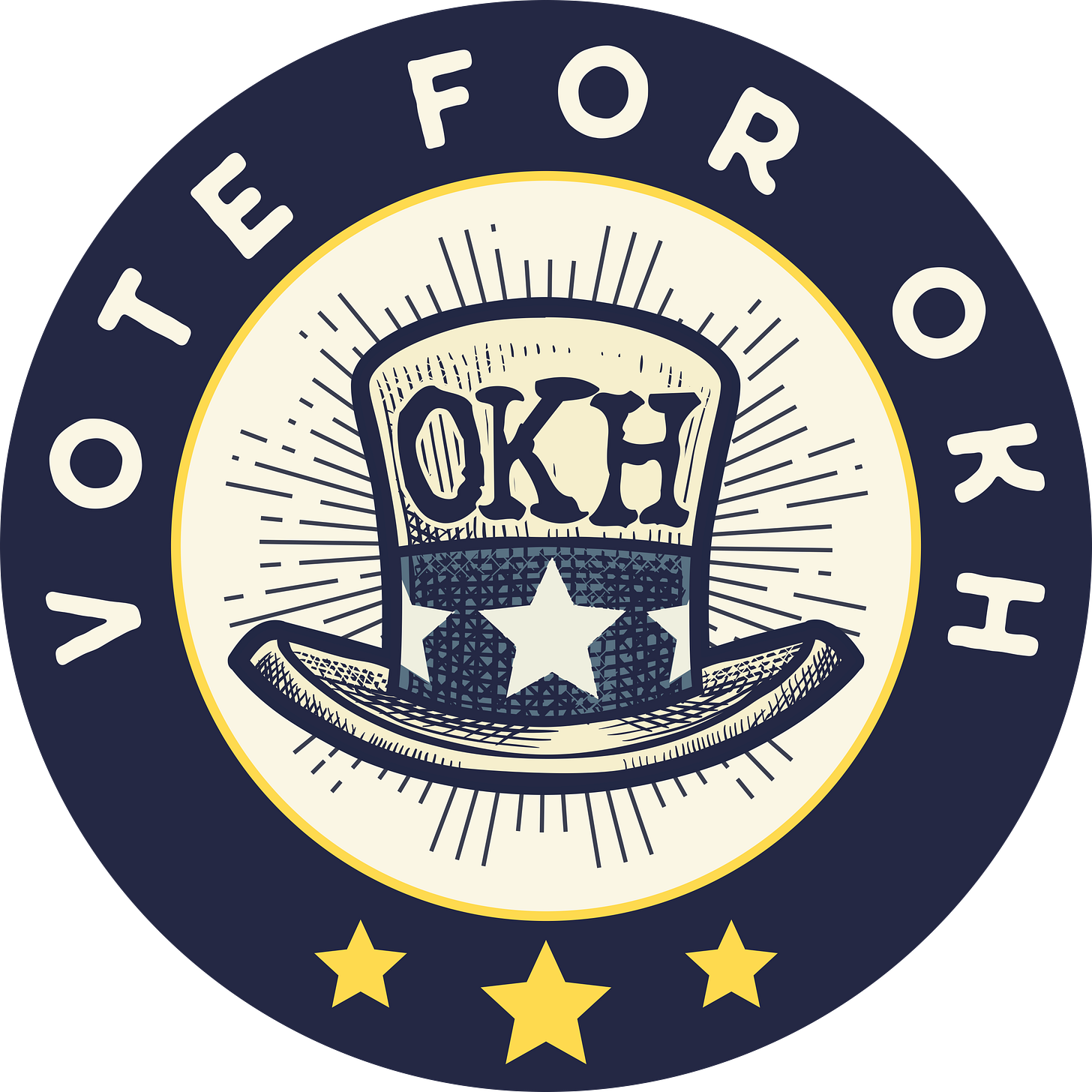Party of Two
It's my party. And this other party party. YOU CAN'T SIT WITH US!
The United States is a two-party political system. I do enjoy the routine cries for a third party, a more reasonable option than voting for the Donkeys or the Elephants. If only there were a third party of reasonable opinions we could all get behind, we wouldn’t have any problems!
We like to think of ourselves as Independent. In a 2022 Gallup poll, the rise of the Independent voter saw 40% of Americans declare their political independence. I’m sure you have met many people, or you are yourself, an independent. They are out there.
When I come across these people out in nature, I ask: Who do you vote for as an Independent, because there has never been an Independent on the ballot that I have seen. It’s a chance for me to appear smarter than I really am, something I relish when given the opportunity. People usually respond that they vote for the candidates they like best, regardless of their political affiliation.
No, it’s not so much as being Independent, it’s about not attaching yourself to either of the two parties and the baggage they carry with them. I get that. In the end, though, you are going to vote D or R in the voting booth, or you are going to screw things up.
This brings us to the next edition of presidential elections, where people are trying to crash a party of two. We could see this play out in 2024 when nephews of former presidents are running as Independent, which, if you read the Gallup poll, should mean there’s a pretty good chance Nephew Wannabee President should win.
But we know that won’t happen.
Let’s head back to the mid-19th century, our favorite time in United States history, and see the birth of a new party, the end of an old one, and the continuation of not getting this right.
Let's dive in.
51: The Presidential Election of 1856
Election Date: November 4, 1856
The Candidates:
In our last round of election rankings, we saw Franklin Pierce emerge as the Democratic nominee who cruised to victory. It would only seem natural that he would use this mandate to usher in a wave of policies to navigate the country through the rocky terrain of slavery.
Unfortunately for him and the country, the only rocks Pierce dealt with were the ones he put into his drink.
Democrats nominated James Buchanan, who wasn’t married and didn’t have children. This must have seemed like the perfect alignment for party leaders because of the tragedies that befell Pierce. You can’t have loved ones who die when they don’t exist. This is the only reason I can think of as to why he was nominated.
The Republican Party made its debut in 1856 when the Whigs couldn’t keep their act together and kept nominating guys who died in office or, in the case of Millard Fillmore, played dead while in office.
The mix of disgusted Whigs and anti-slavery Democrats got together in Philadelphia and nominated John Fremont, who did stuff out West that supposedly was impressive. The Republicans were against the expansion of slavery, an issue that a great deal of people could rally behind.
The Whigs who stayed formed another party, this time called the Know-Nothings. Who did the marketing for these people? Whigs. Know-Nothings. Like, come on.
The Know-Nothings dug up Millard Fillmore and made him their nominee.
Thank goodness we weren’t alive around this time.
Major Issue of the Day:
Slavery was still the main issue.
In April of May that year, John Brown and his abolitionist army engaged in violence over the organization of the Nebraska–Kansas terrorists. The Kansas-Nebraska Act was signed into law two years earlier. While it intended to establish a line between slave states and free, John Brown took matters into his own hands to decide that all of it would be free because enslavers and their supporters would be dead.
In a recurring theme, being Catholic was still an issue for people. Fremont married a Catholic, and the scandal was he had a priest officiate his wedding, which meant he definitely worked for the Pope from that moment on.
The Winner:
Complacency.
Expansion to the West caused the issue of slavery to boil over until something drastic had to be done. In response, the country kept electing Northern presidents who had southern sympathies. We weren’t even 100 years old, and Southern politicians could get people adjacent to their cause into powerful positions for the entire time.
By 1856, the country was satisfied with the status quo, reflecting who was elected president.
Four years later, we needed to correct this issue pronto.
The 2021 OKH Presidential Ranking:
Buchanan came in 43, where he will sit for the rest of eternity, like a presidential purgatory that he will never escape. He was so bad we decided never to elect a bachelor to the White House again. Let those who are Independent of marriage do something else!
The States in the Electoral College:
31. The exact number of states as four years earlier. The District of Columbia doesn’t have a vote.
With no new states entering the union, the three-way race ended with Buchanan taking 19, Fremont securing 11, and somehow Maryland decided it wanted Millard Fillmore back.
There were 296 members of the Electoral College, and the winner needed to secure 149 votes. Buchanan won 174, and Fillmore’s Maryland victory gave him eight. There’s no way Aunt Joan would have voted for Fillmore if she was around back then.
Why Did I Rank it Here:
This is the end of a string of mediocre to bad presidents and the elections that got us here. In 1860, another divided election gave us Abraham Lincoln, a man we needed at the right time when the Civil War broke out and changed the country's trajectory for the better. That was a fortunate break.
Perhaps I should have ranked it lower, especially since we could have corrected the course after the Pierce administration disaster. Instead, we doubled down and got worse.
Let's look at a former president who tries to make an epic comeback and ends up breaking a party in half, handing the presidency to some nerd, but shows us how limited a third-party candidate can be.
Let’s dive in.
50: The Presidential Election of 1912
Election Date: November 5, 1912
The Candidates:
Incumbent Republican President William Taft turned out to be more conservative than the party's progressive wing would have liked. They thought of him as being too cozy with big business and monopolists. Former Republican president Teddy Roosevelt left office after two terms, maintaining the tradition established by Washington by not running for a third term. But he, too, came out against Taft, his close friend. Taft served as Secretary of War under Roosevelt and still referred to him as the President. Teddy didn’t care and tried to take the nomination back.
It didn’t work. Taft won out, so Teddy formed the Progressive/Bull Moose party, which is way cooler than Whig or Know Nothing.
The Democrats needed someone who would break the 44-year White House winning streak the Republican Party had since Abe Lincoln. They turned to Woodrow Wilson, a former professor at Princeton University, who later served as governor of New Jersey. He was a huge nerd.
This also wasn’t a three-man race. The Socialist Party nominated Socialist Whatshisface. I only mention his existence because he won 6% of the vote. That’s incredibly higher in a four-man race that was really a three-man race.
Major Issue of the Day:
The country was doing a lot of striking during this time. Workers in textiles, whatever those are, went on strike not to make those anymore. There were a few railroad strikes, and heck, even the Detroit Tigers baseball club went on strike when its star player was suspended.
Remember, women couldn’t vote at this time. But the Girl Scouts were founded, and the ultimate revenge for women was the cartel of girl business entrepreneurs selling you cookies for the next century.
The Winner:
Nerds.
Wilson was a Princeton grad, Roosevelt went to Harvard, and Taft was a Yale man.
Nerd, nerd, nerd.
The only college Socialist Whatshisface tried to get into was the Electoral one, and he was shut out.
The 2021 OKH Presidential Ranking:
I ranked Woodrow at 11th. Not quite a top-ten president. My older brother was impressed that I thought of racists so highly. I don’t think that was a compliment.
I have a big, fat book about Wilson sitting on my shelf. I can’t wait to dig into it in about 15 years.
The States in the Electoral College:
48. The District of Columbia will still be decades away from participating.
New Mexico and Arizona enter the Electoral College. Each having three electoral votes, they both went with the nerd from New Jersey.
There were 531 members of the Electoral College, and the winner needed to secure 266 votes.
Wilson carried 40 states, meaning he got away with 435 electoral votes. Roosevelt outperformed Taft by getting 88 electoral votes from six states, while Taft limped away in defeat, winning only Vermont and Utah, which meant eight electoral votes.
Why Did I Rank it Here:
This election has always fascinated me. Sometimes, I think it was a great election because the Democrats broke through. Then there are times when I think this election stinks because Wilson wasn’t progressive enough, and really, the country could have used a few more years of Teddy.
Sticking with the theme that more candidates on the ballot isn’t helpful, this election is lower on the list.
Am I wrong? Do you have any thoughts on where I should be ranking these elections?
Anonymous and I are at the beach. While you are reading this, this is the sunrise I got to see:
I get like six more days of this. The good thing for everyone is that I’ll be reading like crazy, which means another book review will be upcoming!
One last thing- since Monday was President’s Day, I got to see what other presidential rankings are out there and came across this one:
presidential_greatness_white_paper_2024.pdf (brandonrottinghaus.com)
What’s funny about this ranking system is that it polls political scientists rather than historians. Not that political scientists can’t rank presidents; I don’t need to remind you that I am neither. But that won’t stop me from making fun of these people.
If you don’t want to click on it, here are some highlights that made me chuckle:
Obama was ranked 7th. That’s um…way too high, in my opinion. As we get further from his eight years in office, we will see the ramifications of his decisions and policies that just weren’t great. He should have closed Gitmo, and Wall Street should have been prosecuted. That’s all I’m saying, people.
Kennedy at 10. I like Kennedy. I like his brother more. I probably have misguided reasons as to why, but Kennedy is not a top-ten president.
I was surprised to see the current president so high at 14. His term is still ongoing, which made me think that the next time I get around to ranking the presidents, I might put in some parameters that stick presidents who haven’t been out of office for 25 years, automatically staying in the bottom tier. So please remember this when I do the next round of presidential rankings at some point in the distant future.
I’ll be back on Monday. Thanks to LV and PV for caring for Blue while we are away.
Have a great weekend!
Okay,
Chris





